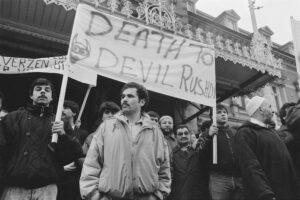The economic alchemy of wealth inequality
The global marketplace is increasingly magnifying and amplifying both economic success and failure. This worrying trend is leading to widening wealth inequality.
With 325 million copies of the Harry Potter books already sold before the release of the latest (which sold 11 million copies in the first 24 hours of publication) and the movies coming in as the third-highest grossing film series ever, it can only have been through some mysterious protective spell that I have remained immune to the magic of the young sorcerer.
I must admit that I'm generally not interested in children's literature and having grown up on a diet of JRR Tolkien, from The Hobbit right through to The Silmarillion, I suspected I would only be disappointed by the quality of Potter's imaginary world when compared with the wonders of Middle Earth.
Although I'm not interested in Harry, I have grown somewhat fascinated by JK Rowling and her own philosopher's stone. It is not the elixir of life referred to in her book, but that other magic property medieval alchemists attributed to this substance: its ability to turn lead and other base metals into gold.
Rowling may not have turned lead into gold, but she did transform a figment of her imagination into a bestseller and one of the most lucrative franchises in entertainment. In the process, she went, in the space of a decade, from single mum on the dole to the world's second-richest woman in entertainment and dollar billionaire, according to Forbes.
As a writer, I naturally would not say no to the prospect of writing a bestseller one day – in fact, my fictional bestseller has been a running joke at home for some years.
Nevertheless, Rowling's runaway success illustrates a worrying trend regarding the global marketplace's apparent ability to magnify both economic success and failure.
English-speaking celebrities in particular have been riding a wave of previously undreamt-of opulence. In fact, their affluence is almost effluent in its odour. Between them, the 100 highest-paid celebrities earned more than $3.1 billlion, in the 12 months to June 2007, with African-American talk show queen Oprah Winfrey ruling the roost.
David Beckham, who has moved his royal court of Beckingham palace to the LA hills, is believed to be raking in half a million quid a week at LA Galaxy. To put that into context, it would take the average Brit nearly three decades to earn as much as Beckham does in seven days. Some stars can even earn millions for what is effectively a day's work.
Together, the world's 946 billionaires are worth a staggering $3.5 trillion – which sits between the annual GDP of Japan and Germany – with converted philanthropist Bill Gates still top of the heap with $56 billion. Mexican tycoon Carlos Slim Helú saw his net worth skyrocket by a dizzying $19 billion this year (equivalent to the GDP of Yemen). Over the last 12 months, he earned as much as over 26.5 million people – of the estimated 3 billion – people subsisting on $2 a day or less.
One reason why this kind of gap appears is that while most of us depend on our labour to earn our daily bread, the superrich have the magnifying effects of capital – and other people's labour – bolstering their fortunes. And such concentrations of capital interfere with the efficient running of the economy and promote social inequality and tension.
To my mind, given the astronomical earnings of “A list” celebrities, top boardroom executives and business tycoons, there is a strong case to be made for the introduction of a cap on earnings, or a “maximum wage”, and a cap on wealth. This would complement the minimum wage to ensure a fairer distribution of wealth in society, particularly as income inequalities, both between societies and within societies, are approaching, or at, all-time highs.
Some will immediately raise objections and say that markets should not be meddled with or else we risk stifling creativity and growth. But what this neoliberal capitalist dogma overlooks is that markets always have been and always will be controlled. But whether they are controlled to serve the interests of the rich or society as a whole is the key difference.
“It's impossible to deny that market fundamentalism has gone too far,” writes Harvard professor Howard Gardener in Foreign Policy, as part of the leading US magazine's recent prescription of 21 solutions to global problems. “There are two modest and generous ways to change this situation.”
He proposes that society's top earners should earn no more than 100 times that of the average income (around £1.7 million or so for the UK) and that no one should be allowed to accumulate an estate 50 times that maximum (around £85 million). The surplus should be given to charity or taken as tax.
“Just 50 years ago, this proposal would have seemed reasonable, even generous. Our standards of ‘enough' have become irrationally greedy,” he notes. “Were these proposals enacted, I predict that they would be accepted with amazing speed, and individuals would wonder why they had not always been in effect.”
The question is how you enforce such limits in a global economy. Can individual countries go it alone or do we need a worldwide agreement at the WTO?
_______
This article first appeared in The Guardian on 27 July 2007.


